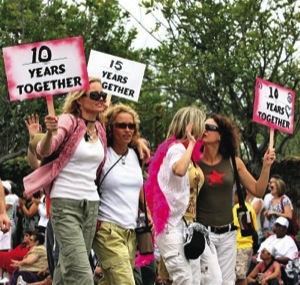
While California has granted domestic partnerships nearly all the same rights as afforded heterosexual couples, as well as provided true legal equality for those in same-sex marriages, the federal government has denied over 1100 rights to legally married same-sex couples, as well as domestic partners and those in civil unions.
1n 1996, during the Clinton administration, the Federal Defense of Marriage Act (DOMA) was passed. It defined marriage as a union between a man and a woman and prohibited the federal government from recognizing any union other than that of one man and one woman.
DOMA also ensured that no state was required to recognize a same-sex marriage or union from another state. Further, it established “spouse” as a word referring to a member of the opposite sex who is a husband or wife.
So, what are the 1100 rights that are denied same-sex couples? Clearly, there are too many to explain here. So, we have chosen to highlight a few that are the most impactful to those in same-sex relationships.
Family Medical Leave
The Family Medical Leave Act of 1993 provided this benefit to all married couples. Since same-sex couples are not recognized by the federal government, we are denied this option.
The ability to petition for a same-sex partner to immigrate
Those in our community that have partners that are citizens of other countries do not have the right to petition for their partner to become a citizen of the United States. A married heterosexual couple receives this right automatically, their spouse gets legal residency immediately. There is abuse of this benefit by ‘fake’ straight couples who are helping people immigrate to the United States, adding insult to injury to committed gay and lesbian couples.
Tax free partner healthcare benefits
The estimated value of an employer’s financial contribution towards health insurance coverage for non-dependent same-sex partners must be reported as taxable wages earned. Heterosexual couples are not taxed for the same benefits.
Social Security benefits
The denial of social security benefits to same-sex couples means that a surviving spouse may spend their waning years in poverty. Once a gay or lesbian partner passes away, the money that should rightfully go to their partner is used to subsidize the payments to others in the system. Heterosexual spouses are entitled to receive retirement benefits based on the deceased spouse’s earning record. Not so for same-sex couples.
For retired married couples, a person whose calculated Social Security benefit is lower than that of his spouse may take half of his spouse’s higher benefit, rather than receive the amount calculated from their own earnings. Gay and lesbian retirees are denied this option.
Family related military and veteran’s benefits
The heterosexual spouses of deceased veterans are entitled to a myriad of benefits, including healthcare, death pensions, educational assistance, home loan guarantees, vocational training and bereavement counseling.
Spouses of living military personnel may be eligible for healthcare, family separation pay and relocation assistance, among many other benefits. Same-sex spouses are not entitled to these services and benefits.
Income taxes
Filing a joint tax return offers advantages over separate returns. Many same-sex couples lose thousands of dollars per year because they have to file separate tax returns with the IRS.
Heterosexual couples can create a “family partnership.” This federal tax law allows couples to divide business income among family members, again resulting in big tax savings.
Married couples can create a trust so that all property left to a U.S. citizen’s surviving spouse is exempt from federal estate tax. That means surviving spouses of heterosexual couples don’t pay a dime of estate tax. Gay or lesbian surviving spouses pay the full amount.
What is most striking is how overtly discriminatory these policies and laws are against gays and lesbians who are in committed marriages, domestic partnerships and civil unions throughout the country. There is nothing subtle about different tax treatment, social security benefits, healthcare or immigration rights. I won’t even begin to address the government’s discriminatory policies at the state and local level like housing and adoption rights.
As an African American, I often wonder why so many in the LGBT community are not actively involved in the LGBT civil rights struggle. I have come to the conclusion that the discrimination the LGBT community experiences, while overt, does not affect our day to day lives all that much.
African Americans were forced to use separate bathroom facilities, accommodations and infamously, made to sit at the back of the bus. Gay and lesbian couples do not experience that type of in your face discrimination; so all in all, many feel very content with the status quo.
That complacency was one of the reasons Proposition 8 passed in the first place. It is high time for our community to be less reactive and more proactive in moving our rights forward on a national, state and local basis. I am happy that 25,000 people marched in San Diego to protest the passage of Proposition 8. Where were the majority of those 25,000 people before the election? They certainly were not in the No on 8 offices.
Are we just too comfortable? When I read the myriad of rights that we are denied because of who we love, I get motivated. I hope you will too. Get involved with one of our national equality organizations. They need your voice and financial support.











